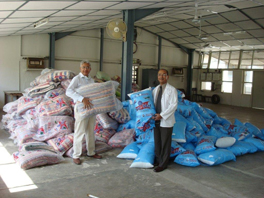As winter approaches, the summer monsoon-induced floods in Pakistan threaten to lead to more deaths and illness.
The flooding, which began in northern Pakistan and has spread to cover almost a quarter of the country, has affected more than 21 million people, according to a Sept. 24 update from Presbyterian Disaster Assistance.
About 1.8 million homes have been destroyed or seriously damaged, leaving about seven million people homeless. These people will be among those vulnerable to disease brought on by cold weather.
"Snow begins as early as October in parts of the north," said Dr. Qamar Zaman, medical coordinator for PDA partner Church World Service Pakistan-Afghanistan. “Winter is approaching, and with freezing temperatures there are a greater number of cases of lower respiratory tract infection."
In addition to respiratory infections, poor nutrition and food shortages put more people — especially children and the elderly — at risk of death this winter.
Government health care facilities have been widely damaged, leaving Pakistanis to rely on services provided by the UN and NGOs. NGOs are supporting basic health care units through infrastructure repairs, medical equipment and qualified staff, and by ensuring that essential medicines are provided at the sites.
PDA, as a member of ACT Alliance, is helping to provide free consultations, essential medicines and maternal and child health services at mobile health units. About 80 percent of patients are women and young children.
The units are also emphasizing education to prevent the spreading of water-borne disease. Another emphasis is WASH (Water, Sanitation and Hygiene). As floodplains clear, the remaining water and animal carcasses might contribute to disease outbreaks. Because affected communities continue to live in temporary settlements, there is also an accumulation of waste, with no permanent water and sanitation facilities.

Doctors give the bedding to affected families. The hospital and staff gived about $3,500 to buy the materials.
PDA is providing access to drinking water, sanitary facilities and emergency medical services, with a focus on the needs of girls, women and the elderly. Staff are providing hygiene kits, buckets, aqua tabs, water disinfectants and mobile water treatment units.
Along with its partners, PDA is providing shelter kits to some of the thousands of displaced families. These kits contain tents, blankets, plastic sheets, cooking utensils, jerry cans, oil lamps and oil.
As floodwaters recede in the north, parts of the south are still submerged. On the weekend of Sept. 19, Manchar Lake overflowed, displacing 100,000 people in Sindh province’s Dadu and Jamshoro districts.
Estimates suggest that the floods have affected more than 21 million people, including 3 million children, making this one of the most serious disasters in a generation.
"While the number of deaths is relatively small compared to large disasters like the Haiti earthquake and tsunami, in terms of the numbers of people affected and the ongoing impact, the scale of these floods is unprecedented, and the larger challenges are ahead," the PDA situation report reads.
The second appeal from ACT, released on Sept. 16, increased the amount of the appeal by more than three times, from a target of about $4,102,000 to a target of about $12,441,000.
As of the beginning of September, PDA had sent almost $250,000 through partner agencies to aid in flood relief efforts.
Presbyterians are urged to give to PDA through the One Great Hour of Sharing offering as well as the designated Pakistan account: DR000038 – Pakistan.
Individuals can give online or send a check indicating the account to:
Presbyterian Church (U.S.A.)
P.O. Box 643700
Pittsburgh, PA 15264-3700
Presbyterians are also encouraged to act by staying informed about the situation and sharing information with others. And prayer is always needed.
"Please continue in prayer all those affected by this flooding and for those who are offering assistance. Pray for the displaced families to know they are not forgotten," the report reads.
Information furnished by Presbyterian Disaster Assistance.

